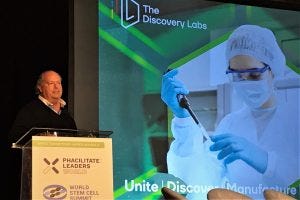
The newly formed Center for Breakthrough Medicines is building what it claims to be the world’s largest third-party cell and gene production facility at an ex-GSK site in Pennsylvania.
For the production of cell and gene therapies, size matters, according to Brian O’Neill, founder of the Discovery Labs.
He announced this week at the Phacilitate Conference in Miami, Florida that a 680,000 square-foot facility at a site in King of Prussia, Pennsylvania – a former GSK R&D campus sold to O’Neill’s life science and real estate investment company MLP Ventures in 2018 for around $50 million – will become “the world’s largest cell and gene contract development and manufacturing organization [CDMO].”

The Discovery Labs founder Brian O’Neill unveiled plans to enter the cell and gene therapy CDMO space at Phacilitate this week
Lonza’s facility in Houston, Texas currently claims to be the largest CDMO site in the cell and gene therapy production space at 300,000 square feet.
Through $1.2 billion of funding by MLP Ventures, Discovery Labs’ Center for Breakthrough Medicines aims to help solve the lack of production capacity currently plaguing the industry, which is slowing down development in the field and increasing manufacturing costs.
“Our mission is to accelerate the delivery and affordability of lifesaving and life-changing therapies from discovery to commercialization by providing one source for process development, plasmid and viral vector production, analytical testing, and cell bioprocessing,” O’Neill said.
He claimed he is entering the cell and gene CDMO business primarily for the patients, and while this is a line many life sciences firms reiterate, the fact that he refuses to ever take this or any of his companies private and bow down to shareholder demands – “I can’t stand answering to a 24 year old analyst who has never run a business in his life” – gives the claim some gravitas.
“It takes 36 months to build a facility, but the average age of a terminal patients is less than 12 months. I thought how unjust that a father would have to explain to their child that they’re going to die because there’s not enough capacity to build drugs that can actually save their life.”
Everything under one roof
With this venture he is therefore aiming big.
“There is no sense coming out and building a small-scale operation,” he said, adding that while other drugmakers are busy scaling out their operations through a complex network of facilities and third-party support, the Center for Breakthrough Medicines will simplify this by bringing “everything under one roof,” and eventually creating “a series of mega-facilities around the world that you can get everything you need in one place.”
The facility aims to therefore provide end-to-end manufacturing services including, process and analytical development, plasmid DNA production, viral vector production (lentivirus and AAV), testing and analytics services, cell therapy bioprocessing (for autologous, allogeneic, and gene-edited therapies), cell banking, and – in the future – monoclonal antibody and microbiome production services.
The current plans comprise of three floors and a basement per building with 36 cell processing suites, 20 viral vector suites, 20 development suites, and 10 plasmid suites. However, O’Neill stressed the importance of flexibility across the whole site to adapt to changes and demands from customers.
A spokesperson from the company told Bioprocess Insider that depending on platform and technology, each suite is expected to have four to 20 campaigns per year.
The first Buildings will be mechanically complete in 2020, with commissioning and qualification following. Specific timings will be based on the process and client requirements, we were told.
2,000 staff
For such an ambitious project the CDMO is going to need a lot of staff. 2,000 staff, to be precise, to be recruited over the next 30 months.
With the industry affected by a lack of available talent, not least in the emerging cell and gene therapy space, this could pose a problem, so we asked about the CDMO’s strategy to fill these roles.
According to both O’Neill and the company spokesperson, the firm has retained Nucleus Careers, a cloud-based specialty life sciences human capital management company, to build out the entire team. Nucleus has proprietary software designed for large scale human capital buildouts of high growth companies, something the Center for Breakthrough Medicines said gives it confidence of attracting and retaining talent.
About the Author
You May Also Like

schedl_b_and_w.jpg?width=100&auto=webp&quality=80&disable=upscale)
schedl_b_and_w.jpg?width=400&auto=webp&quality=80&disable=upscale)



